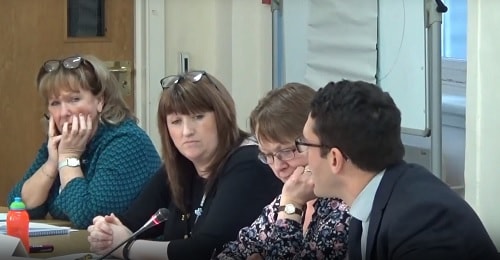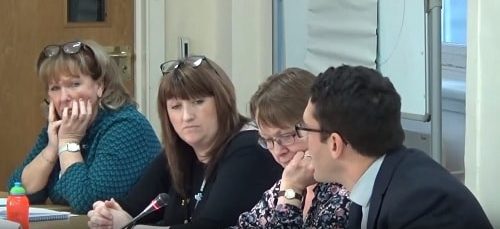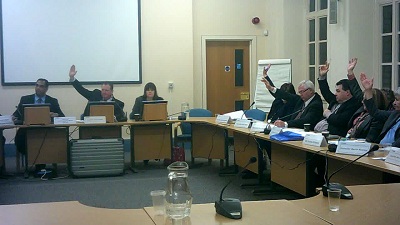Have the “bureaucratic machinations” returned to Wirral Council?

Labour’s Cllr Tony Smith (Cabinet Member for Children and Family Services) explaining at a Wirral Council Cabinet meeting why he thinks the Cabinet should agree to consultation on closure of Lyndale School
Following yesterday’s blog post Surjit Tour emailed councillors (and myself) with his advice. My two replies to his advice are below. We’ll see what happens next.
from: Tour, Surjit surjittour [at] wirral.gov.uk
to: john.brace [at] gmail.com
cc: “Davies, Phil L. (Councillor)” ,
“Smith, Tony A. (Councillor)” ,
“Foulkes, Steve (Councillor)” ,
“Brighouse, Alan (Councillor)” ,
“Hodson, Andrew C. (Councillor)” ,
“Harney, Tom (Councillor)” ,
“Green, Jeff E. (Councillor)” ,
“Gilchrist, Phil N. (Councillor)” ,
Cllr Ian Lewis ,
“Povall, Cherry (Councillor)” ,
“Williams, Patricia M. (Councillor)” ,
“Burgess, Graham” ,
“Roberts, Andrew D.”
date: 11 February 2014 17:42
subject: RE: Cabinet (12th February 2014) Agenda Item 7 Schools Budget 2014/15 and call in of Cabinet minute 140 (proposals for changes to school top up payments for students with high needs)
mailed-by: wirral.gov.uk
Dear Mr Brace
Thank you for your email.
In the event that the Schools Budget is approved at the Council meeting on 25 February, that does not preclude any action that may or may not arise as a result of the call-in hearing scheduled for 27 February being followed through.
Paragraph 4.6.5 of the Schools Budget Report outlines the purpose of the SEN Top Up Contingency, one of which is:
“Any unforeseen consequences arising from the implementation and review of High Needs Top Ups.”
The call-in therefore remains a valid issue to be determined.
Yours sincerely
Surjit Tour
Head of Legal & Member Services
and Monitoring Officer
Department of Transformation and Resources
Wirral Metropolitan Borough Council
Town Hall
Brighton Street
Wallasey
Wirral
CH44 8ED
Tel: 0151 691 8569
Fax: 0151 691 8482
Email: surjittour [at] wirral.gov.uk
Visit our website: www.wirral.gov.uk
First reply (to same recipients as above)
Dear Surjit Tour,
Thank you for your email. You are right that the report to Cabinet states at 4.6.5 “Any unforeseen consequences arising from the implementation and review of High Needs Top Ups” and imply in your email that this “review of High Needs Top Ups” refers to the call in meeting on the 27th February.
This is also what was stated at 2.6.5 in the report that went to the Schools Forum meeting of the 22nd January 2014 (agenda item 4 Schools Budget Report 2014/15) published on the 17th January 2014 (see
http://democracy.wirral.gov.uk/documents/s50016401/Schools%20Budget%20Report%202014-2015.pdf ).
That report was published one day after it was decided at Cabinet (minute 140) on the item Proposals for Changes to School Top Up Payments for Students with High Needs that “the Special Schools Contingency is used to support specialist provision facing financial difficulties (amendment to the second sentence of recommendation 3)” (a decision that was called in).
Therefore
a) the special schools contingency existed in a report before the item was called in and
b) is part of the decision at the 16th January Cabinet that was called in.
Bearing this in mind, perhaps this explains to you my view that the schools budget report going to Cabinet tomorrow contains elements of a decision that have been called in.
Finally, as the line “Any unforeseen consequences arising from the implementation and review of High Needs Top Ups” existed in a report to the Schools Forum before this item was called in, it therefore cannot be referring to any decision arising from the call ins or the call in meeting.
Yours sincerely,
John Brace
2nd reply (same recipients plus Emma Degg also copied in)
Dear Mr Tour (and others),
In order to make my views crystal clear I will outline a few different scenarios that will result should the Schools Budget for 2014/15 be agreed by Cabinet this evening and referred to Budget Council on the 25th February 2014.
Scenario 1
All members of the Coordinating Committee deciding the call ins are also members of Council. They each vote on the budget (including the schools budget), voting on an identical budget & policy to the decision which has been called in. This year because of a change in legislation it will be done as a card vote. The press will report how politicians voted and this information will be known by the public on the 26th. Some people will therefore think that when councillors meet again on the 27th that they have already made their minds up and that whatever happens at the Coordinating Committee they will vote the way they did 48 hours previous to the meeting.
It will be seen as predetermination of the call in matters at best and a prejudicial interest at worst. The constitution describes the Coordinating Committee as an overview and scrutiny committee and the Code of Conduct has this to state on such matters:
12. In relation to any business before an overview and scrutiny committee of the Council (or of a sub-committee of such a committee) where –
…….
12.3 that business relates to a decision made (whether implemented or not) or action taken by you (whether by virtue of the Authority’s Constitution or under delegated authority from the Leader):
You may attend a meeting of the overview and scrutiny committees of the Council or of a sub committees of such a committee but only for the purpose of making representations, answering questions or giving
evidence relating to the business, provided that the public are also allowed to attend the meeting for the same purposes, whether under a statutory right or otherwise.
In other words, voting at Budget Council two days before the call ins is seen as according to the Code of Conduct as generating a prejudicial interest that would prevent councillors voting at the
Coordinating Committee.
Scenario 2
The Schools Budget is referred to Budget Council. Councillors on the Coordinating Committee declare a prejudicial interest in the vote on the schools budget by virtue of the call in and don’t participate in that part of the Budget setting process.
Scenario 3
The Schools Budget is decided at the reserve budget meeting after the Coordinating Committee decides the call ins (which would seem to be the most sensible option).
Finally, I will point out that officers re tabling identical proposals (that have been called in but not yet decided) is certainly not a good idea as it puts councillors in the difficult position as outlined above. I’ve made my position clear that the constitution states “and no action will be taken to implement the decision until the call-in procedure has been completed.”
Do you genuinely believe that the Cabinet making a decision to recommend the Schools Budget to Budget Council, with identical proposals in it to that which have been called in is complying with this part of the constitution? Is the Council’s constitution just being ignored or do you just have a massively different interpretation on words whose meaning would seem crystal clear to me?
I hope you reconsider and to avoid the above scenarios happening and advise Cabinet that the schools budget would be best decided at the reserve Budget Council meeting after the call in meeting has met and reached a decision on the call ins.
If you click on any of the buttons below, you’ll be doing me a favour by sharing this article with other people.
53.402022-3.070415



